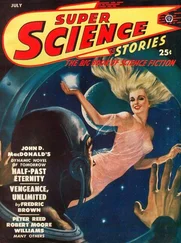Bill Walch inspected the end of his cigar. For a moment his face was absolutely blank. He said softly, “I’d hate to think you’d gotten yourself a job with another paper, Max. I’d hate to think this was something fancy.”
“How fancy can I get? That’s your chance, the same way I took a chance with your boy named Norma.”
Bill suddenly smiled, a warm and hearty smile. “We can straighten this out fast, Max, boy. I’m expecting a call from Jerry any minute. When it comes in, I’ll ask him and we’ll soon know. Okay?”
With sinking heart and with an attempt to match Bill’s smile, Max said heartily, “That’ll be fine. Fine!”
Within a few seconds the phone rang. Bill said, “Be good and go back out into the waiting room, will you? This is pretty confidential. Big out-of-town deal.”
On wooden legs Max went to the waiting room. He had the feeling that the gun had been left in the wrong hands. It would feel splendid in his pocket.
It was five minutes before Bill Walch appeared. He came into the waiting room with a wide smile and a long white envelope, saying, “It checked out, Max. Here’s your deposit. Come back and see us when your people get their lease attended to. Tell them that for strictly hands off by the county cops as well as the state boys, we’ll take ten percent of the gross, based on a monthly audit.”
Max went through the motions like a large smiling mechanical toy. He mumbled words of farewell, backed to the door, found the knob, went on down the corridor to the elevators. As he waited for the bronze arrow to swing up to the right floor, he peeked into the envelope. A flat sheaf of bills. All hundreds. Fifteen of them. He slipped the money out of the envelope, folded it once and slid it into his bill clip, behind a few tired fives and ones.
Down to the street he looked both ways, suddenly wary. It had seemed almost too easy. The tough part was to come — telling Marylen that the way Walch handed over the money was conclusive proof that her sweetie was no longer a matter of interest to the census taker.
He had worked on some fine fat stories, and in the process the Chronicle had chewed lightly on the frayed edge of the Concord organization, on the underlings, on the not-too-smart. But never had a lead opened so nicely. And there was no paper to back him. No organization. It was too early in the game to ring in the law. Yet he grinned with a certain satisfaction, and the grin, as always, erased the somewhat moody lines of his heavy face, made him look younger and even a shade reckless.
Yet the hair on the back of his neck seemed to prickle. He walked casually east, stopped to look in a window. A man who had no place to go. The third window of the department store was rigged out as a bedroom, with a plastic dolly sitting on the dressing-table bench. The dressing table had a mirror. It was in that mirror that he saw the one who sauntered on the far side of the street, pausing to cup his hands around a cigarette, tossing the match aside.
And behind the man who sauntered, a car slid to the curb. But nobody got out of it.
Max turned away from the window, walked more rapidly to the corner. As he walked, his mind was busy. Obviously Walch had ordered the tail. But why? Where had there been a slip? Or did Walch still want to cover in case it was a frame and Max was working, on the side, for another paper, or even for one of the perennial civic improvement groups? If Walch was worried enough to employ the tail technique, it would have been easier for him to play dumb about the fifteen hundred.
The obvious thing was to get back to the girl. He picked up a cab at the corner, glanced back in time to see the saunterer swing into the waiting car.
“Uptown,” he directed.
After five blocks he leaned forward, handed the driver a bill. He said, “I might leave you in a hurry, friend. Pay no attention.”
The driver gave a quick and startled look over his shoulder. Then he looked in the rear vision mirror. He said, “Friend, I’ll make a little time and then slow down by the Casualty Trust. Hop out there and go right through the building and with luck you can grab a downtown bus in the next block.”
“You are an intelligent and perspicacious citizen.”
“Thank you too much.”
Max went through the bank at a semi-lope, looking ahead with the expression of a man trying to catch up with someone.
There was no bus, but there was a cab. Max grabbed it, looked back. Three blocks away he thought he saw a tiny figure come hurrying out of the door. He wasn’t certain.
He took the chance of giving his own address. The elevator was in use, so he ran up the stairs, breathing hard. He had his key out and stopped absolutely still when he saw the door was ajar. He kicked it open, moved to one side and called, “Marylen!”
The rooms were empty and dusty, and the tired sun made too much of a point of the frayed rug. The keys that had slid from Gruber’s hand lay in the sunlight. Gruber’s hand was in shadow. The keys were on a chain neatly decorated with a white plastic death’s-head. Gruber lay on his face with his legs spread, his toes pointed in. Max cursed slowly and monotonously as he knelt by Gruber. He got his thumb on the right part of the stringy wrist, felt the strong pulse thud. He rolled Gruber over. There was a deep red spot on the point of Gruber’s chin.
The girl was gone, and her clothes were gone. On the dresser, there was a note in sprawling backhand finishing school writing which merely said: “Thanks for everything.” The note was weighed down with the Jap automatic. The safety was off. He noticed with clinical detachment that it was a silly way to leave a gun.
Gruber responded to the water treatment, dopey at first, and then violently and thoroughly angry, with all the heat and force that a stringy, sandy little man can develop.
Max finally got the sense of it. Mr. Raffidy had locked the girl in. This friend of hers had come and the friend had asked to have Gruber unlock the door. The girl had seemed eager to have the door unlocked. He remembered the friend, a small plump man with red cheeks, saying, “Miss Banner, Jerry is down in the car waiting for you.”
After he had unlocked the door and the girl was in the bedroom dressing, Gruber had stepped in for the expected tip. The man had reached for his hip pocket and then his hand had come up too fast from his hip pocket.
No, Gruber was going directly to the cops. No fat little so-and-so was going to put the slug on him right in his own place. Max blocked the doorway while Gruber danced up and down in a rage, getting even madder as he found a tooth splinter in his mouth.
Max got hold of one of the crisp hundreds. He crackled it, said, “This is to lick your wounds with, Gruber. This is oil for troubled waters. You can gripe all you want with the hundred in your pocket. Or you can yell cop and the hundred is in my pocket.”
Gruber’s dance of anger slowly settled down into a shuffling of feet and then he said, “A deal. But what are you mixed up in, Mr. Raffidy?”
“Never mind me. What did the guy look like?”
He didn’t get more than the original description. Gruber hadn’t seen the car. The girl seemed happy, but worried. At least, that’s the way her voice sounded. Gruber went down to the elevator, grumbling about a respectable apartment house, and how the hell was he to know what kind of friends Raffidy had.
Max sat on the edge of the cot. The door was shut and he was alone with his enormous guilt. He thought of all the things he should have done. A nice safe hospital for the girl. An immediate report to Lowery, District Homicide Squad Captain.
He clenched his fists and looked at his knuckles. Raffidy, the hero type. Raffidy, the job-hungry kid. So hungry for a job that he got the girl a date with her boyfriend. Her nice dead boyfriend.
Читать дальше
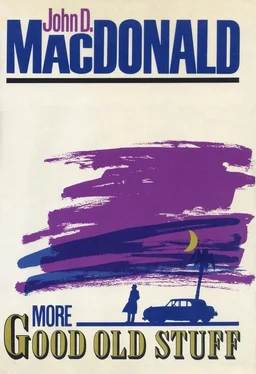
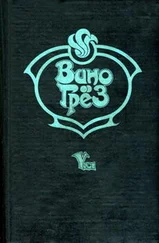
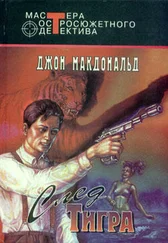
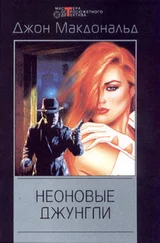
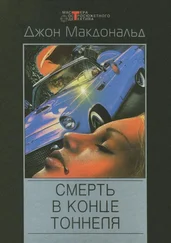
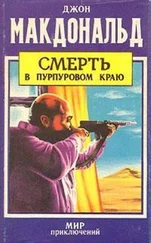



![Джон Макдональд - Wine of the Dreamers [= Planet of the Dreamers]](/books/430039/dzhon-makdonald-wine-of-the-dreamers-planet-of-thumb.webp)

